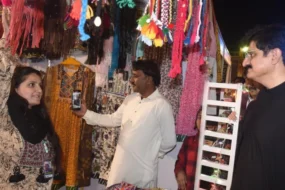
It was my birthday, April 7, and I was far from India, in San Francisco. I remember feeling a little adrift that day, scrolling through Instagram, when a reel gently caught my eye: handcrafted golden earrings glinting softly against cotton sarees, set to music that felt like home. The caption read: Dokra Revival. Artisan Jewelry. Crafted with Love.
There was something about the jewelry. It didn’t just look beautiful. It felt like it carried a memory. The brand was called Miharu. I couldn’t stop thinking about it.
Two months later, when I returned to India, I reached out to the woman behind the brand: Parul Maskara Bajoria.
When we met at Mirabelle Café, she walked in wearing a puff-sleeved blouse, radiant Dokra jewelry, and the calm, grounded air of someone who knows who she is. She smiled, handed me a small beige potli, and inside were the exact same earrings I had seen on my birthday.
It felt like I had manifested them.
But let me tell you two even more beautiful stories of manifestation. Hers.
Born in Siliguri, Parul went to Delhi to study computer science and pursued a diploma in fashion design alongside it. “Delhi opened me up,” she says. She lived with her uncle, who exported garments to H&M, surrounded by fabric samples, production meetings, and possibilities. “It made me independent. It gave me vision.”
After completing her studies and returning to Siliguri, Parul once peered into the windows of the NIFT campus and saw mannequins, fabrics, and mood boards. She fell in love. Around the same time, she watched her cousin attend computer classes at a local center, and that world of technology stayed with her too.
After marriage, she moved to Bankura. When asked what she wanted as a wedding gift, she asked for a computer. With it, she started a computer center, a franchise of Aptech, just like the one she had once dreamed of. Later, in Durgapur, she fulfilled her second dream by starting a fashion institute called Horizon in collaboration with a Siliguri institute.
But the real turning point came when she first saw the Dokra artisans of Bankura. “I was spellbound,” she remembers. “When I learned this craft had survived for over 4,000 years, it felt magical.” She wanted to bring that magic into people’s everyday lives.
Miharu was born soon after. A name stitched from love, combining Mihika and Arushi, her daughters. “Miharu is literally my third child,” she says. “I’ve nurtured it with the same love and patience.”
Her work goes beyond jewelry. It’s a partnership with the artisans, eight Dokra families, and suburban women she trains in finishing and packaging. “They trust me to help them live better lives, and I trust their love for the craft. It’s mutual,” she says. “I don’t always get it right, and they help me see things I miss. We learn from each other.”
Her biggest early challenge was a Fabindia order. “We had to produce in bulk and maintain quality. I just told myself: trust God, trust yourself, and then get to work.” She worked alongside the artisans, even doing finishing work herself. “Over-planning never helps. Just start. Keep going. Things will fall into place.”
Miharu has since partnered with Fabindia, Reliance’s Swadesh, Jaypore, and Taj Khazana. It has been featured in National Geographic, and Parul was named among the top 25 women entrepreneurs by AIRSWEE. She was honored with the FOSMI Outstanding Women Entrepreneur Award, presented to her by the late Dr. A.P.J. Abdul Kalam.
But she is not just building a brand. She is building a bridge between forgotten rural traditions and modern urban lives.
What’s even more special is that she is bringing these experiences to Kolkata. Through workshops at the Kolkata Centre for Creativity, Parul invites us to sit beside artisans, shape wax, polish metal, and feel connected to something timeless. “We need to make these crafts desirable again,” she says. “They’re beautiful, but stuck in old formats. That’s what I’m working to change.”
She told me, “I couldn’t just be a woman who raised kids and ran a home. I had to create something of my own.” Today, even her daughters look at Miharu with pride. “They see now what it taught them, that you must follow your dreams.”
Parul didn’t just revive a craft. She revived a way of living. With meaning. With slowness. With soul.
We need more people like her. We need more Paruls in this world.
Women who remind us that even from a small village, you can build something real. Something rooted. Something that touches everyone.
And I’m so grateful I met her.










